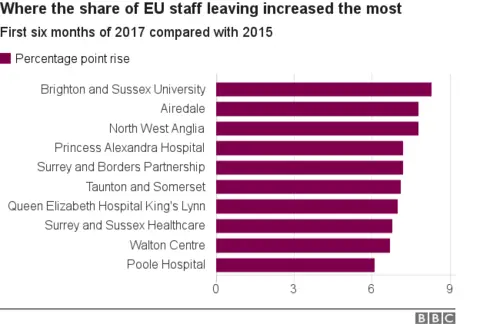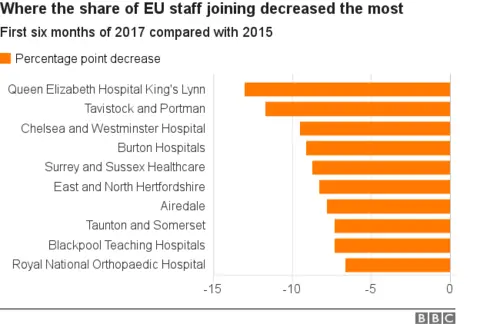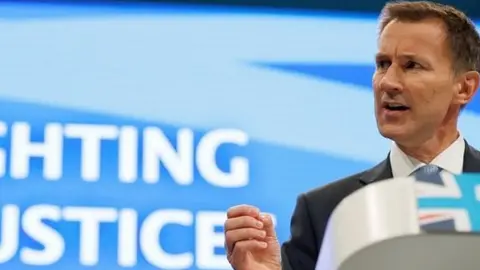Share of European Union staff leaving NHS rises following Brexit
 sturti
sturtiThe proportion of EU nationals leaving jobs in the NHS is rising, while the share of those joining is shrinking.
The BBC analysed NHS Digital figures, which showed the trend in England over the past two-and-a-half years.
Health experts say the UK's decision to leave the European Union in June 2016 was behind the trend.
The Department of Health says new language requirements for EU nurses may have played a part.
The analysis comes days after the Care Quality Commission (CQC) said the health system was "straining at the seams" and faced a "precarious" future, highlighting staff shortages and rising vacancy rates.
What do the figures show?
In the last full year before the referendum - 2015 - there were 7,535 EU nationals who left NHS Trusts, making up 5.6% of workers of all nationalities leaving their jobs.
The following year, EU nationals accounted for 6.6% of all leavers, and in the first six months of this year, they made up 7.4%.
The pattern was repeated in 80 NHS Trusts out of 240 across England.
The proportion of EU staff joining fell over the same period. In 2015 EU nationals made up 10% of new joiners. In the first six months of 2017, they accounted for 8.2%.
That trend was reflected in 62 trusts.
Danny Mortimer, co-convenor of the Cavendish Coalition, which represents health and social care organisations, said: "This analysis starts to confirm anecdotal stories we are hearing from our members, especially in the South East.
"Our members don't feel able to recruit in big numbers.
"There are practical challenges like the exchange rate [between the pound and the euro] is weak - and the number of people choosing to leave is increasing."

The trend was more pronounced when focussing solely on nurses. In the year before the vote, EU nurses made up 7.6% of all the nurses leaving nationally, rising to 11.5% in the first six months of 2017.
Almost one in five nurses, 6,299 out of 34,595, joining the NHS in 2015 came from other EU member states. In the first six months of 2017 this had fallen to just one in 10 newly-recruited nurses.
One source told the BBC of at least one NHS trust that had abandoned a recruitment fair on the continent due to poor response rates.
The General Medical Council surveyed more than 2,000 doctors from the European Economic Area (EEA) in February and of the 60% who said they were thinking of leaving the UK at some point in the future, nine in 10 said the UK's decision to leave the EU was a factor in their considerations.
Janet Davies, chief executive of the Royal College of Nursing, said: "A nurse who trained in Lyon or Lisbon is as much a part of the NHS family as one trained in London. But sadly, it is no surprise that so many are leaving - few can live with the uncertainty.
"During the Brexit negotiations, [Prime Minister] Theresa May must reassure nurses from around Europe that they are needed and welcome in the NHS. It would not survive without their contribution."
Overall, the NHS says there are around 3,200 more EU nationals working in the NHS than at the time of the referendum, as the size of the health service continues to grow.
Over the same period, there has been a slight reduction of 162 nurses, which it suggests may be down to the Nursing and Midwifery Council introducing new language requirements in January 2016, making it more difficult to be eligible for employment.

But our analysis shows the growth is slowing. The year-on-year percentage increase in the EU workforce dropped from 16.8% in 2015 to 2.7% in the first six months of 2017.
Experts say England does not yet produce enough home-grown staff for the NHS to meet staffing requirements without workers from abroad, although the government wants to make the country "self-sufficient" in training doctors and create thousands more nursing training places to boost the domestic workforce.
The Commons Health Select Committee previously began to take evidence on the implications of Brexit but postponed its inquiry when the snap General Election was called for June 2017.
Health Secretary Jeremy Hunt had told the committee the government had stopped short of publishing its own analysis because "the publication of what might be called the worst-case scenario could itself have an impact on negotiations".
Dr Andrew Dearden, the treasurer of the British Medical Association, said: "We know that Brexit has already had a huge impact on the morale of EU NHS staff working here. Our own research has shown us that more than four in ten EU NHS staff are considering leaving the UK following the EU referendum result."
A spokeswoman for the Department of Health said: "There are 3,193 more EU nationals working in the NHS than at the time of the referendum — we have been absolutely clear that these staff play a vital role in the NHS and want to see their excellent work continue long after the UK leaves the EU.
"However, we recognise the NHS also needs more home-grown staff, so we'll be training an extra 1,500 doctors and 10,000 nurses, midwives and allied health professionals a year by 2020 to ensure the NHS has the workforce it needs both now and in the future."
 Reuters
ReutersAcross the UK
In Wales, the proportion of EU nationals leaving the NHS was 2.5% the year before the referendum, rising to 3.5% in 2015-16 when the vote took place. It has since returned to 3%.
Neither NHS Scotland or The Department of Health in Northern Ireland records the nationality of leavers and joiners.
More about this story

The Shared Data Hub makes data journalism available to news organisations across the media industry, as part of a partnership between the BBC and the News Media Association.
For more information on methodology, click here. For the full dataset, click here.
The figures do not include data for GPs and practice staff or Clinical Commissioning Groups, and concern headcount rather than full-time equivalent posts.
